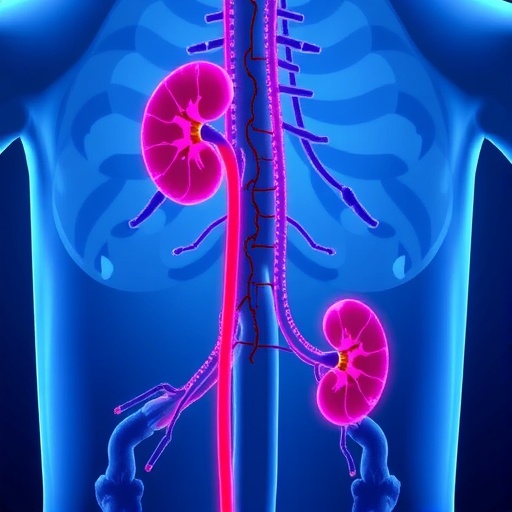A recent longitudinal study has unveiled a groundbreaking connection between serum β-hydroxybutyrate and its protective role in early diabetic kidney disease. Conducted by a team of researchers led by Kim et al., this investigative work published in Diabetes Therapy delves deep into the potential of β-hydroxybutyrate as a biomarker and therapeutic agent for diabetic nephropathy. As diabetes continues to impact millions worldwide, understanding its complications, particularly kidney disease, has become crucial.
Diabetic kidney disease (DKD) represents one of the most serious complications stemming from diabetes, affecting approximately 30% of patients who have had diabetes for over 20 years. This condition contributes significantly to morbidity and mortality rates among diabetic individuals. Given that the early detection and intervention methods for DKD are still inadequate, researchers have prioritized the need to explore innovative biomarkers that can herald the advancement of kidney damage.
At the heart of Kim and colleagues’ research is β-hydroxybutyrate, a ketone body traditionally viewed as a byproduct of fatty acid oxidation. However, emerging evidence suggests that β-hydroxybutyrate influences cellular metabolism and signaling, thereby potentially providing protection against various pathological conditions, including DKD. The study’s authors propose that serum levels of this compound could serve as a valuable indicator of kidney function and progression of disease in diabetic patients.
The study involved a diverse cohort of participants diagnosed with type 2 diabetes. Researchers meticulously measured not only serum β-hydroxybutyrate levels but also other traditional risk factors for DKD such as proteinuria, glycemic control, and blood pressure. The findings suggested an unexpected correlation: higher serum levels of β-hydroxybutyrate were associated with preserved kidney function over time, highlighting a potential protective role against nephropathy.
Throughout the study, researchers employed advanced techniques to assess kidney function, including glomerular filtration rate (GFR) calculations and urinary biomarker analysis. These methodologies enabled them to establish a robust framework for examining kidney health among participants. It became evident that individuals exhibiting elevated β-hydroxybutyrate levels showed slower progression of kidney impairment, marking a significant finding in nephrology.
Moreover, Kim et al. explored the possibility that β-hydroxybutyrate contributes to kidney protection through various mechanisms. For instance, they hypothesized that β-hydroxybutyrate may exert anti-inflammatory effects, thus countering the chronic inflammation linked with diabetic kidney disease. By reducing inflammation, this ketone body could effectively mitigate the damaging processes leading to nephron injury.
Additionally, the study emphasizes the metabolic flexibility that β-hydroxybutyrate offers. Unlike glucose, which feeds into a more pro-inflammatory metabolic pathway, ketones like β-hydroxybutyrate promote energy production in renal cells more efficiently, possibly enhancing their survival and function in a diabetic environment. This marked shift in metabolic pathways could open doors for new treatment options focusing on enhancing the utilization of ketone bodies in patients with diabetes.
As researchers continue to decipher the mechanistic pathways involving β-hydroxybutyrate, discussions surrounding its potential clinical applications are burgeoning. Could β-hydroxybutyrate supplementation emerge as a strategy to prevent or slow the progression of DKD? Early evidence suggests promising avenues for further exploration.
However, it is crucial to acknowledge that this is a nascent area of research, and the results from Kim et al. warrant further validation through larger, multicenter clinical trials. Additionally, unraveling the molecular pathways modulated by β-hydroxybutyrate in the context of kidney health may require intensive investigation into its pharmacokinetics and long-term safety.
In conclusion, the study conducted by Kim et al. represents a pivotal step forward in understanding the intricate relationship between metabolic health and kidney function in diabetic patients. As the landscape of diabetes management continues to evolve, fostering a deeper comprehension of compounds like β-hydroxybutyrate may soon lead to innovative therapies that could significantly impact patient outcomes.
By enhancing our understanding of the metabolic underpinnings of diabetic kidney disease, this research highlights not only the role of existing biomarkers but also suggests the potential for new therapeutic strategies focused on metabolic modulation. The implications of these findings transcend academic interest and venture into the realm of practical, clinical application, expanding the toolkit for managing diabetic complications effectively.
As the scientific community continues to probe the significance of ketone bodies, the findings from this study may catalyze a paradigm shift in both the diagnosis and treatment of diabetic kidney disease. In a world where millions face the challenges of chronic conditions like diabetes, the development of safer, more effective therapeutic options is of utmost importance, and research like this is paving the way.
The quest for knowledge does not end here; the journey through renal health and diabetes management is ongoing. As more is understood about the relationship between serum β-hydroxybutyrate and kidney function, we may be on the brink of discovering novel pathways to improve health outcomes for countless individuals living with diabetes.
In summary, the protective role of serum β-hydroxybutyrate in early diabetic kidney disease is not just a story of research; it is an emerging narrative of hope that could reshape therapeutic approaches and ensure better lives for those affected by diabetes and its complications.
Subject of Research: The protective role of serum β-hydroxybutyrate in early diabetic kidney disease.
Article Title: Protective Role of Serum β-Hydroxybutyrate in Early Diabetic Kidney Disease: A Longitudinal Study.
Article References: Kim, S.R., Lee, M., Lee, Yh. et al. Protective Role of Serum β-Hydroxybutyrate in Early Diabetic Kidney Disease: A Longitudinal Study. Diabetes Ther (2025). https://doi.org/10.1007/s13300-025-01819-3
Image Credits: AI Generated
DOI:
Keywords: β-hydroxybutyrate, diabetic kidney disease, metabolic flexibility, nephrology, inflammation, biomarkers, diabetes therapy.




